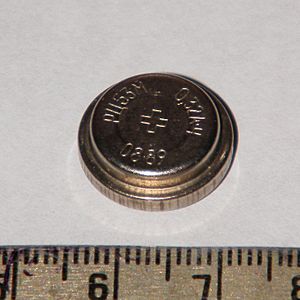Mercury battery facts for kids
A mercury battery is a type of primary cell, which means it's a battery that can only be used once and cannot be recharged. These batteries were once very common because they could provide a steady amount of power for a long time. However, they contain a toxic metal called mercury, which is harmful to the environment and people. Because of this, mercury batteries are now rarely used and are restricted in many places around the world.
Contents
How Mercury Batteries Work
Mercury batteries create electricity through a chemical reaction. Inside the battery, zinc metal reacts with a compound called mercury(II) oxide. This reaction causes electrons to move, which creates an electric current. The battery also contains a liquid called an electrolyte, which helps the chemical reaction happen. This electrolyte is usually made from sodium hydroxide or potassium hydroxide.
Why They Were Used
Mercury batteries had some important advantages that made them popular for a while:
- Long Life: They could last for a very long time, much longer than some other types of batteries.
- Steady Power: They provided a very steady and reliable voltage (power output) throughout their life. This was great for devices that needed a constant power supply, like hearing aids, calculators, and some cameras.
- Compact Size: They could be made quite small, which was useful for portable electronic devices.
Environmental Concerns
The biggest problem with mercury batteries is the mercury they contain. Mercury is a heavy metal that is very poisonous. If mercury batteries are thrown away in regular trash, the mercury can leak out and pollute the soil and water. This pollution can harm plants, animals, and even people. Because of these serious environmental and health risks, many countries have banned or heavily restricted the sale and use of mercury batteries. This has led to the development of safer alternatives, like silver oxide batteries and alkaline batteries.
Related pages
See also
 In Spanish: Batería de mercurio para niños
In Spanish: Batería de mercurio para niños
 | William M. Jackson |
 | Juan E. Gilbert |
 | Neil deGrasse Tyson |


